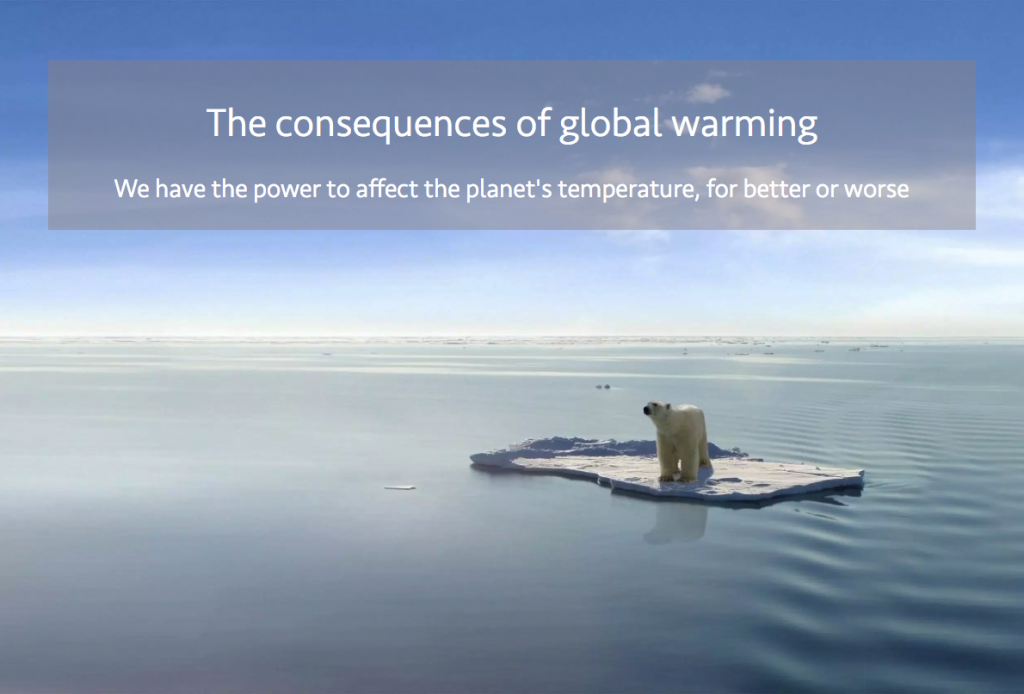
UN’s Intergovernmental Panel on Climate Change
Recently, the UN’s Intergovernmental Panel on Climate Change released an alarming report declaring that the planet’s climate change concerns may soon reach a boiling point. In what has been hailed as “…the most thorough distillation of existing data on climate change to date,” the panel outlined a grim future waiting in the wings should humanity not drastically reduce its output of emissions.
Biblical Catastrophes
Reading like an updated list of Old Testament plagues, the potential consequences of not switching to a more sustainable energy-procurement pathway are an assortment of bleak and punishing conditions that include all of the greatest hits in the apocalypse’s repertoire:
- Large-scale famine
- Raging wildfires
- Widespread coral reef die-offs
- Severe weather
These and other disasters can all be expected as temperatures soar, according to the panel.
Most concerning of all is the short time frame in which we can expect to experience climate change-related disasters. Per the panel’s findings, by the year 2040, the opening overtures in this devastating symphony will begin to ring out in the form of severe weather events – unless we hit the brakes on our collision course with disaster by mounting an effort that transforms the global economy at a speed and scale with “no documented historic precedent.”Clearly, if climate change continues snowballing at its present rate, we’ll soon find ourselves in a world in which snow is but a faint memory. However, there are ways in which we can all help cool down the human race’s impact on global temperatures. Read on to discover what exactly is climate change, what’s causing it, how it will affect us in our lifetime, and what you can do to both save money – and the world.
What Does Climate Change Mean?
Since the late 1960’s, the idea of global warming – or climate change, as it’s more commonly known nowadays – has been in the popular consciousness. In recent years, it’s been pushed to the forefront of policy debates by a tidal wave of data demonstrating both its devastating effects and its origins in human activity. But what exactly is climate change?
While climate change used to refer to a collection of processes that affect the Earth’s climate, in recent years it has evolved to focus specifically on anthropogenic – or human induced – changes in climate. In contrast to the concept of global warming, which concerns itself only with the planet’s surface temperature, climate change holistically considers the network of occurrences that can affect climatological conditions on Earth.
But no amount of words can explain the issue as powerfully as the data itself:
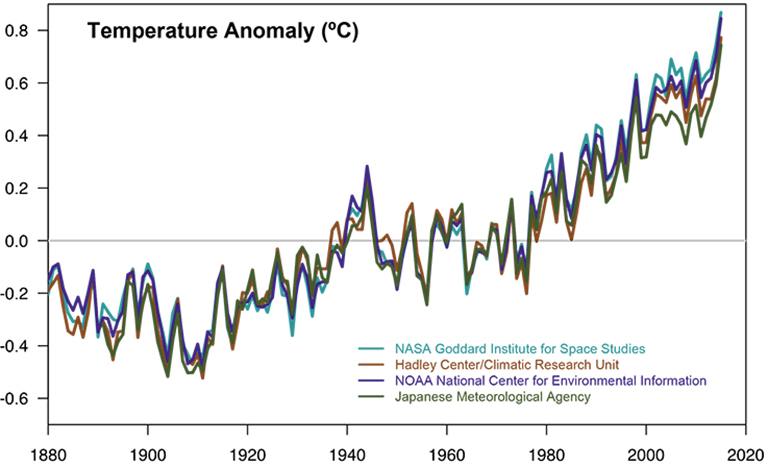
As seen above, there is unanimous consensus between the data of four leading scientific agencies. Temperatures are indeed rising.
And as seen below, the surge in carbon dioxide levels has dramatically spiked for the first time in history, at a time which corresponds with the massive industrialization sparked by humans.
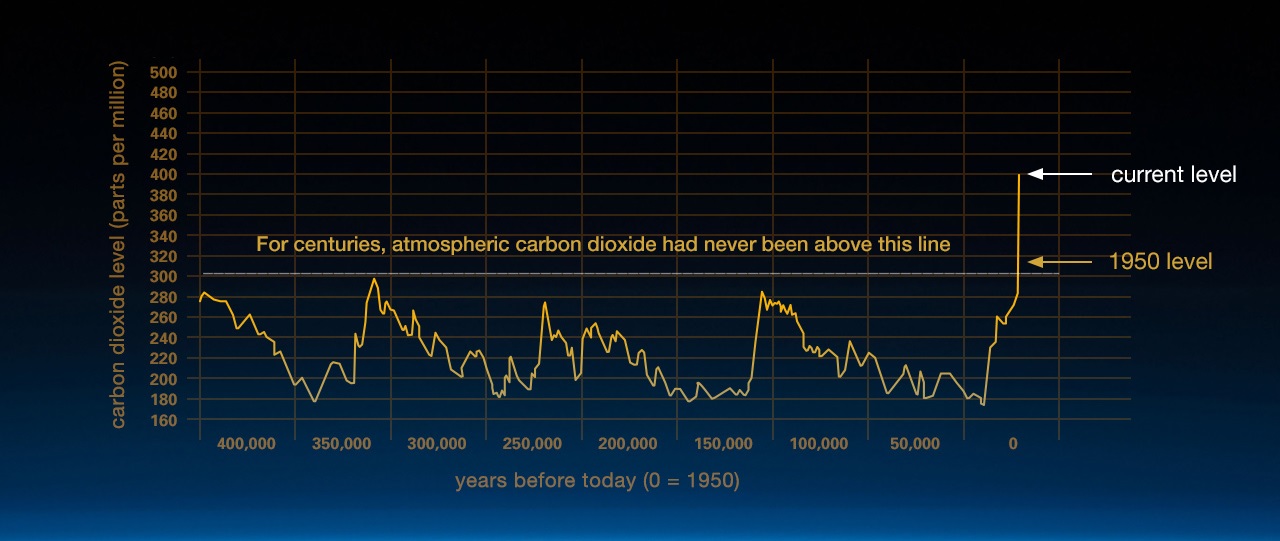
What causes Climate Change?
You may have heard about global initiatives to help the planet go green. Included amongst these is a movement to abandon dirty, emissions-rich pollutants such as fossil fuels in favor of clean, renewable energy sources such as solar panels or wind turbines. This is because going green refers to the process of reducing or eliminating emissions of a group of gasses known as greenhouse gasses. While the term “Greenhouse Gasses” may bring to mind images of environmentally-friendly gasses that promote the growth of flowers (after all, they even have the word “green” in their name), nothing could be further from the truth!
Greenhouse gasses wreak environmental devastation by radiating energy in every direction – including towards the ground. This results an increase in the planet’s temperature, and causes what is known as, “The Greenhouse Effect.”
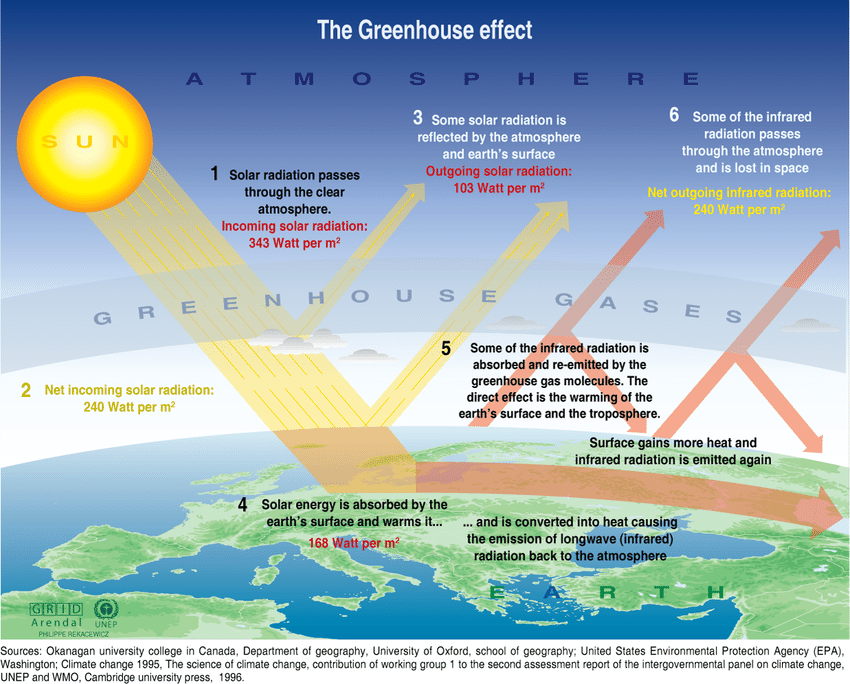
There are a variety of gasses that contribute to the greenhouse effect. This killer carbon cabal includes such notable names as:
- Carbon Dioxide
- Methane
- Nitrous Oxide
- Water Vapor
- Ozone
Since many human activities either release or prevent the containment of these gasses, it comes as no surprise that the scientific community is in agreement that human economic behavior is the primary force behind climate change.
Which activities create the most greenhouse gasses?
The worst offenders when it comes to releasing greenhouse gas emissions are fossil fuels. These fuels made from the remains of Jurassic-era organisms are signing our species’ death writ in dark, caustic plumes of toxic smoke cast across our skies. Yet, everyday, they’re used to generate electricity, heat homes, and power vehicles – creating 80% of the greenhouse gas emissions in the United States.
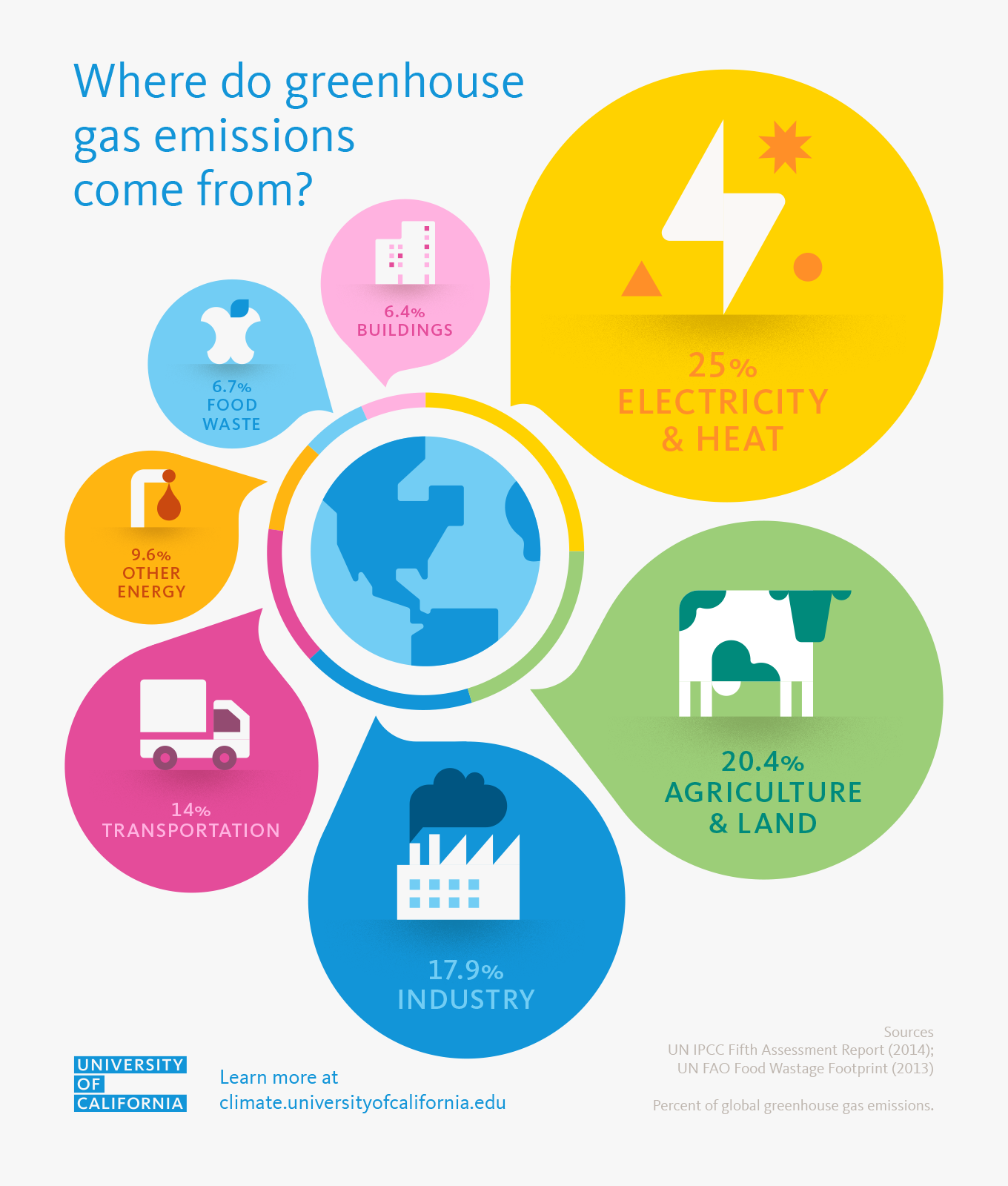
What’s most appalling, however, is that modern advances in engineering have made reliance on fossil fuels an addiction we must break instead of a necessary evil. Indeed, countries such as Costa Rica and Iceland have learned to wean themselves off of poisonous power sources, and taken a courageous step towards a cleaner tomorrow by pivoting towards a 100% renewables-based energy generation model.
However, it’s not only tropical paradises and Viking strongholds that can help reduce the stain of fossil fuels’ smudged, carbon footprint: By switching to clean, emissions-free solar energy for your home, you too can contribute to the reversal of dangerous levels while simultaneously substantially reducing your energy bills.
Solar leased through Neeeco requires no money down and offers protection from fluctuating energy markets with a low, locked-in, fixed electricity rate.
What are the consequences of climate change?
Even an average temperature increases of 1.5 degrees Centigrade can act a match to a powder-keg. Warmer ocean waters have lead in recent years to stronger, more potent hurricanes, and rising ocean levels are a clear and present danger to coastal cities the world throughout. However, there are other lesser-known effects of global warming, such as:
- The release of ice-age era viruses previously incarcerated within icebergs.
- Warmer temperatures allowing insects to enter regions in which the cold previously kept them at bay.
- Melting ice caps releasing the carbon dioxide they once held, flooding the planet with even more greenhouse gasses and raising temperature to life-threatening peaks.
Can anything be done to avoid global disaster?
Though tackling climate change is certain to be the hardest undertaking humanity has ever endeavored to accomplish, it’s without a doubt the most necessary as well. Since most greenhouse gasses find their roots in the burning of fossil fuels, reducing the use of fossil fuels is critical to allaying climate change’s stranglehold on our species’ long-term viability.This can be accomplished if we heed the advice of Mahatma Gandhi and be the change we want to see in the world.
How to reduce your home’s carbon footprint
- Install solar panels—You’ll not only reduce your monthly utility costs, but also join a green revolution composed of people who are ready to use the technology of tomorrow to preserve the world we love today.
- Insulate your home–With proper insulation in your walls, less energy leaks from your home and more money stays in your pocket.
- Schedule a no-cost home energy audit–Find out exactly how your home can be made more energy efficient. Then get incentives and discounts from Mass Save® to offset the cost of these home improvements.
The bottom line
The UN’s forecasted disasters in 2040 might not occur if we take action to reduce our carbon emissions. In just two, short decades, we’ll look back and realize how important it was to have taken climate change seriously – but it might be too late.They say, “Hindsight is 20-20,” but the knowledge and power are in your hands right now to join the ranks of those who proved that foresight occurred in 2018.
Take advantage of tomorrow’s technology to turn the clock back on global warming today.
Call (781) 514-5882 or contact us to get started with a no-cost Mass Save® home energy assessment.
